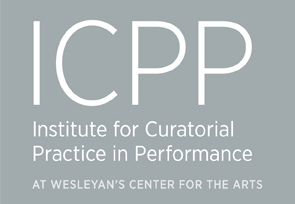Ford Foundation Supports Wesleyan’s Institute for Curatorial Practice in Performance


Wesleyan’s Institute for Curatorial Practice in Performance (ICPP) received a two-year, $150,000 grant from the Ford Foundation.
The award will support a new leadership fellowship program; three curatorial mini-intensives for prospective students; and two global curatorial forums designed to bring an international perspective to the discussion and dissemination of best practices and forge a global network of performing arts curators. This funding will further ICPP’s efforts to advance diversity among participants and to amplify the graduate program’s impact on the field of performance.
“The Ford Foundation funding allows ICPP to support diverse perspectives in the field of performance curation, both in our student body and as our students advance professionally,” said Sarah Curran, director of the Center for the Arts and managing director of ICPP. “We are also grateful for the opportunity to create a global platform for curatorial exchange.”
“This support from the Ford Foundation allows ICPP to amplify a visible and inclusive path into the program and equitable opportunities as our students, in their second year, pursue leadership positions in the field,” said Samuel Miller ’75, director and co-founder of ICPP.
“This grant is a recognition of the crucial role the arts play at Wesleyan,” said Wesleyan President Michael Roth. “The Institute for Curatorial Practice in Performance supports an interdisciplinary and cross-cultural approach to performance, which has an impact far beyond campus.”
The first recipient of the fellowship, Ali Rosa-Salas, was selected by a committee comprised of ICPP faculty, senior staff and curatorial advisors based on her performance and scholarship during her first year of the Master’s program; the viability/originality of her proposed fellowship project; demonstrated need; and fit with the partner organization, New York’s Abrons Arts Center, where she is director of performance programs.
“I am deeply honored to be the first recipient of the ICPP Leadership Fellowship,” Rosa-Salas said. “This award will support an exciting direction in my curatorial practice, and will provide the resources necessary to devise programming at the Abrons Arts Center that is responsive to the prismatic histories of the Lower East Side, in partnership with community members. The fellowship is a testament to ICPP’s vision of curatorial practice as a civic practice, and of the program’s demonstrated commitment to supporting early career curators at a critical stage of their professional development.”
Two additional fellowships will be awarded to second-year Master’s students of the program during the 2018–19 academic year to provide a pathway to leadership for historically underrepresented perspectives in the professional world of performance curation. Upon graduation, the fellows will develop and execute a curatorial project at an arts organization and will continue in this role for up to one year. The fellowships offer the opportunity for the actualization of work developed by students in their thesis or practicum coursework. The Leadership Fellowship supports ICPP’s mission of diversifying the workforce in arts organizations and expanding the curatorial perspectives in performing arts presentation.
The two global convenings, in November 2018 and March 2019, will focus on curating traditional dance forms in conjunction with a visit by the Sultan of Yogyakarta, Indonesia; and on arts exchange in sub-Saharan Africa.
Introduced as a pilot initiative in 2011, the Institute for Curatorial Practice in Performance at Wesleyan is the first institute of its kind, a center for the academic study of the presentation and contextualization of contemporary performance. The low-residency program offers students a Master’s degree in innovative and relevant curatorial approaches to developing and presenting time-based art. ICPP encourages emerging curators to enrich their understanding of intellectually rigorous, innovative, and artist-centered curatorial models. The mix of instructors—artists, scholars, curators, cultural leaders, writers and theorists—is intended to spark new possibilities and connections both intellectually and professionally. Instructors provide theoretical and practical tools for students to deepen their research methodologies through reading, writing, viewings and discussion. Students simultaneously put ideas into practice in their professional lives, developing responsive curatorial practices that address the interdisciplinary nature of performance work today.

